Credit freezes help you thwart identity theft by preventing a crook from opening credit in your name.
Credit freeze laws, sometimes referred to as “Credit Lock” laws, began in California in 2003.
Now, all 50 states in American, in addition to Washington D.C. and Puerto Rico, have laws permitting residents to lock or shut down access to their credit reports with the credit bureaus.
With a credit freeze, an identity thief can’t apply for credit in your name because you must first provide a PIN (Personal Identification Number) to the credit bureaus in order to “unfreeze” or “thaw” out your credit report and allow access to it.
How to Initiate a Credit Freeze
Surprisingly, relatively few people have actually locked their credit reports.
By some estimates, only a few hundred thousand individuals have requested a credit freeze – this despite the millions of people who have been victimized by identity theft.
Still, people victimized by identity theft can and do use credit freezes.
Additionally, individuals concerned about privacy and unauthorized access to their credit can also initiate a credit freeze.
In fact, many states with credit freeze laws have given residents the right to have a credit freeze free of charge.
In order to obtain a credit freeze, you must provide the credit bureaus with the following:
- a unique PIN or password
- proper identification to verify your identity
- proper information regarding third parties who are authorized to review your credit file
Getting a Credit Freeze From Equifax
Equifax does not charge a fee for a credit freeze. It does, however, require that you put your request for a security freeze in writing if you are a victim of identity theft.
You must send your written request to:
Equifax Security Freeze
Equifax
P.O. Box 105788
Atlanta, Georgia 30348
If you are not a victim of identity theft, you can place a credit freeze online here.
Getting a Credit Freeze From TransUnion
With TransUnion, the agency used to offer security freezes free of charge online. However, as of July 14, 2009, TransUnion started charging for security freezes. The cost ranges from about $3 to $10, depending on where you live. Also, the fees apply only to those who have not been victims of identity theft. Identity theft victims get freezes free of charge with the credit bureaus. To contact TransUnion about a credit freeze click here or call 888-909-8872 or write to:
TransUnion Security Freeze
TransUnion LLC
P.O. Box 2000
Chester, PA 19022-2000
Getting a Credit Freeze From Experian
At Experian, you can request a security freeze online at www.experian.com/freeze or submit your request in writing.
What You Need to Have When Contacting the Credit Bureaus
Unlike initiating a fraud alert, you must place a security freeze with each individual credit bureau separately.
When requesting a security freeze from any credit bureau, be sure to include your full name, complete address (and any previous addresses if you’ve lived at your current residence less than two years), social security number, date of birth and proof of your identity and address together, such as a copy of your driver’s license or a copy of a recent utility bill or credit card statement.









Comments are closed.